Eden Reyna's Senior Blog
Essential Question: How can Criminalists ensure that test results are accurate and concise?
Friday, May 27, 2016
Blog 24 - Last Presentation Reflection
(1) Positive Statement
What are you most proud of in your block presentation and/or your senior project? Why?I am most proud of putting so much effort into thoroughly researching this topic. This helped me learn a lot about forensics even without a mentor for the whole first semester of the year. I am also proud that I didn't give up on forensics and change my topic to an easier topic just because it was very difficult for me to find a mentor. As for my block presentation, I am proud of how successful my activities were in helping the audience further learn about my answers. Lastly, I am also proud of how much I improved on presenting in front of a class and speaking loudly.
(2) Questions to Consider
a. What assessment would you give yourself on your block presentation? Use the component contract to defend that assessment.
P. Met all the P consideration criteria. Dressed professionally, eye contact, engages audience, Justification of answers, organization and creativity.
b. What assessment would you give yourself on your overall senior project? Use the component contract to defend that assessment.
P. Although I missed a couple of assignments throughout the year, I continued to remain on track with my research. It was difficult to complete some assignments because I didn't have a mentor so I mainly relied on research.
(3) What worked for you in your senior project?
The best thing that worked for me in my senior project was how broad and diverse my topic is so that helped me find more quality research.
(4) (What didn't work) If you had a time machine, what would you have done differently to improve your senior project?
The one thing that didn't work was not being able to find a mentor. If I had a time machine, I would've used different search words while I was researching on forensic mentors. If I had a mentor from the beginning of the year, I would've saved my self a lot of wasted time and saved pointless research. I also would've gotten better grades on my first 2 lessons and even completed interview 2 which had to be on your mentor.
(5) Finding Value
How has the senior project been helpful to you in your future endeavors? Be specific and use examples.
I chose forensics as my senior topic because I was really interested in it and wanted to learn more about it. I even thought of forensics as a possible career option. However, after all the research I went through and the people I talked to, I now know that it isn't a job I would want to persue. I still love and enjoy forensics but it isn't a right career choice for me. Also, because I know so much about the topic of forensics, I can state why I would not want forensics as a career.
Wednesday, May 4, 2016
Blog 23 - Exit Interview Prep
My essential question is "How can a Criminalist, ensure that test results are accurate and concise?". My answer 1 to this question is the quality assurance of the work performed of criminalists. My answer 2 is the prevention of cross contamination of evidence that is done within the evidence stream. My answer 3 is the acknowledgement and compliment of new technology that is being released to help improve the work of forensics. My best answer would have to be answer 2, the prevention of cross contamination of evidence done in the evidence stream. This is because cross contamination is mostly human error and although no one can be perfect, there is still a lot that can be done to minimize that factor and thus leading to a criminalist ensuring that test results are accurate and concise.
(2) What process did you take to arrive at this answer?
My mentor actually talked to me about cross contamination and how it is a big deal within criminalistics. From that, I started to touch base on it and begin digging deeper into the research of it. In an interview with my mentor, she stated that cross contamination is a very important issue in the field of forensics, or criminalistics to be exact.
(3) What problems did you face? How did you resolve them?
My biggest problem was finding a mentor. For about the whole first semester of this school year, I could not find a mentor. I called about every forensic laboratory, sheriff department, coroner office and mortuary within Southern California. I finally resolved that problem by encountering forensicscienceacademy.org and called Terri Armenta where she gladly accepted to become my mentor for the remainder of the year.
My biggest problem was finding a mentor. For about the whole first semester of this school year, I could not find a mentor. I called about every forensic laboratory, sheriff department, coroner office and mortuary within Southern California. I finally resolved that problem by encountering forensicscienceacademy.org and called Terri Armenta where she gladly accepted to become my mentor for the remainder of the year.
(4) What are the two most significant sources you used to answer your essential question and why?
The two most significant sources I used to help me answer my essential question was, first, my mentor and second, the Innocenceproject.org. These sources have given me much more than just answer, but more knowledge that can positively affect me when giving my final presentation.
The two most significant sources I used to help me answer my essential question was, first, my mentor and second, the Innocenceproject.org. These sources have given me much more than just answer, but more knowledge that can positively affect me when giving my final presentation.
Friday, April 22, 2016
Blog 22 - Independent Component 2
LITERAL
- I, Eden Reyna, affirm that I completed my independent component which represents 32 hours of work.
- Armenta, Terri. "Forensic Training Unlimited." Terriarmenta.com. N.p., n.d. Web. 22 Apr. 2016. <http://www.terriarmenta.com/>
Neufeld, Peter, and Barry Scheck. "Home - The Innocence Project." Home - The Innocence Project. MADEO, n.d. Web. 22 Apr. 2016. <http://www.innocenceproject.org/>
- Independent Component 2 Log
- I completed a 15 page magazine explaining different topics within forensics. It begins with a typical magazine cover to engage readers and quickly points out the important information within the magazine. Which I made my self with some help of photoshop. With a well organized table of contents, I began my research and image searching to help everything flow.
- The amount of time I put into this component has felt like way more than 30 hours but when I added up my hours, it came down to 32 hours. This magazine has significant meaning to me because I feel like it is a way for my to talk to people about forensics in a way that I normally cant. It also allows me to express my self about forensics in a more interesting way. Because I already know a sufficient amount of forensics, it was difficult for me to write. Formatting and getting everything to fit and look nice took the longest and also finding nice relevant pictures.
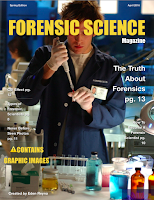
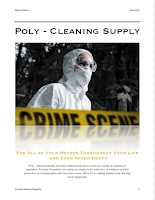
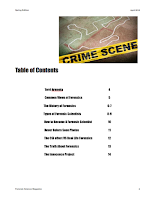


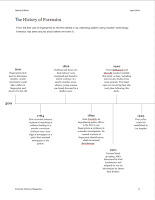
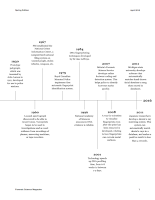
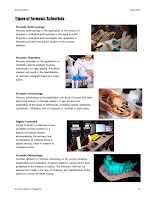
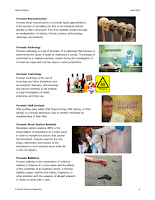
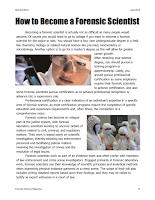
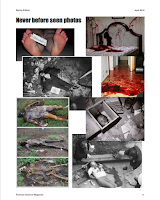
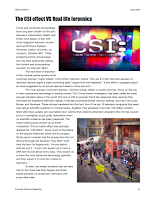
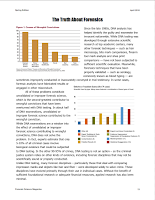
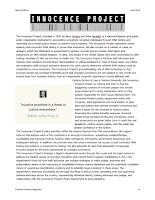

- The component helped me answer my EQ in a way that I can look back and use my own magazine as a resource for forensics. It helped my answers for my EQ become more organized and helped me understand more. Also when I was researching for more input into context, I found more sources that could be really helpful towards my final presentation.
Friday, April 15, 2016
Blog 21 - Interview 4 Reflection

The most important thing I learned from this interview is that forensic scientists try their best to avoid errors that can affect their work. AFIS technicians use the method of double checking with over pair of eyes and is actually a well known standard within the field of forensics.
2. How will what I learned affect my final lesson?
What I learned will affect my final lesson by providing a different perspective of forensics and also giving me more accreditation of my research and final answers.
Interview 4
Wednesday, March 9, 2016
Blog 20 - Interview 4 Preparation
1. Who do you plan to interview? What is this person's area of expertise?
I plan to interview Angel Gonzalez who is an AFIS Technician II at the Sheriff's Department of the County of Los Angeles.
2. Post 20 open-ended questions you want to ask an expert in the field concerning your senior project. Your focus should be finding answers to your EQ.
- How would you describe your job and what you do?
- How did you get to where you are now in your career?
- What obstacles did you have to face?
- What is your opinion on the broad topic of forensics?
- What is fingerprint analysis and what is AFIS?
- I understand fingerprint analysis is very tedious and involves a lot of room for errors. How do you deal with something like that?
- How do you deal with errors if any?
- How do you prevent errors?
- Would you say that say method would apply to other forensic fields? How?
- Do you think forensics is in badly need of reform? If so, why?
- Are you aware of the Innocence Project? If so, what is your opinion on it?
- How do you feel about the CSI effect?
- In what ways do you think it affects real life forensics?
- My EQ is How can a forensic scientist ensure that an analysis of a crime is correct. How would you answer it?
- Do you think quality assurance along with accreditation and also knowledge of modern technology can thoroughly answer my EQ?
- How are you able to know that the field of forensics will become more accurate after the possible solution is taken into place?
- How important is technology within the field of forensics?
- After researching on this topic for several months now, what kind of resources do you recommend that can help me get my answers into a concrete state?
- The government needs to provide more funding into forensics although the Coverdell Act is already in place and a lot of reform is needed within the labs. Do you think analysts need to be more frequently certified to improve forensics or is there another area/field that can make a greater impact?
Wednesday, March 2, 2016
Blog 19 - Third Answer
How can a Forensic Scientist ensure that an analysis of a crime is correct?
Forensic scientists need to keep up with their training in order to be kept up with any type of new emerging technologies and techniques that might affect their job.
There is new technology constantly emerging in today's society and a lot of which can help improve the work of forensics.
Without rigorous training and certification, forensic scientists would have no clue about improving forensics and what they can do to contribute to it.
There are many different techniques of forensics in the world today but not all are available to forensics within the U.S. thus explaining why scientists need to constantly be trained.
Interview 3
Mentorship
Many forensic scientists working now, already have the education and the credentials but just like teachers, they need to be constantly trained and accredited to ensure that they can give correct analysis' by keeping up with new emerging technologies.
Thursday, February 18, 2016
Blog 17 - Interview 3 Reflection
1. What is the most important thing I learned from the interview?
The most important thing I learned from the interview, is that forensics isn't as bad as I thought it was. It still has some flaws but a lot of other careers do too and the benefit is that it is improving.
2. How has your approach to interviewing changed over the course of your senior project?
It has changed the course of my senior project because I found flaws in my essential question and answer that I need to fix.
Interview 3
Subscribe to:
Posts (Atom)





